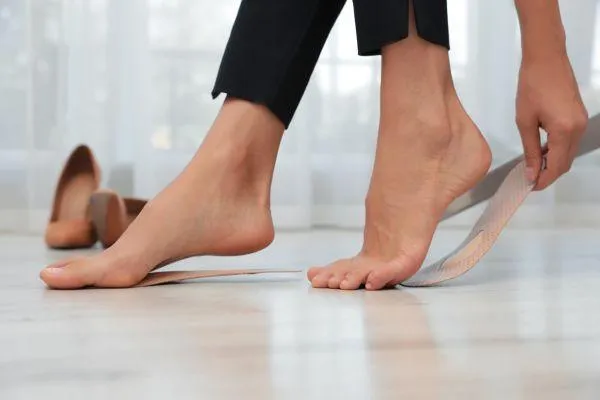Tips & Advice From Foot & Ankle Associates of Southern NH

Understanding Cavus Foot: Causes and Symptoms of High Arched Feet
Have you ever noticed that your feet have a more pronounced arch than usual? If so, you might be dealing with a condition known as cavus foot, also referred to as high arched foot. While many people have a natural arch in their feet, those with cavus foot experience an excessively high arch that can lead to pain, instability, and other foot issues. At our podiatry clinic in Derry, we want to help you understand what cavus foot is, what causes it, and the symptoms to watch for so you can seek treatment early.
What is Cavus Foot?
Cavus foot is a deformity of the foot that results in an abnormally high arch. The arch may be so high that it causes the foot to be less flexible, leading to an increased risk of pressure and discomfort. Unlike a flat foot, where the arch collapses, cavus foot causes the arch to become overly rigid and raised. This condition can affect one or both feet and can range from mild to severe.
Causes of Cavus Foot
Cavus foot can develop for a variety of reasons, some of which are congenital (present at birth) while others are acquired over time. Here are some of the common causes:
Genetic Factors
Many cases of cavus foot are inherited. If you have a family history of high arches or other foot deformities, you may be at a higher risk of developing cavus foot. Genetic predisposition plays a significant role in the formation of high arches.Neurological Conditions
Cavus foot can also be associated with neurological conditions, such as cerebral palsy, Charcot-Marie-Tooth disease, or polio. These conditions can cause muscle imbalances and affect the way the muscles and tendons in the foot work, leading to the development of a high arch.Trauma or Injury
In some cases, cavus foot may result from injury or trauma to the foot or ankle. Damage to the nerves or muscles that support the foot structure can cause an abnormal foot arch to develop.Idiopathic
In many cases, the exact cause of cavus foot is unknown, which is referred to as idiopathic cavus foot. This means that the high arch develops without a clear, identifiable reason.
Symptoms of Cavus Foot
Cavus foot can vary greatly from person to person, but there are several common symptoms that people with this condition might experience. Recognizing these symptoms early can help you seek treatment before the condition worsens.
High Arch
The most noticeable symptom of cavus foot is the presence of an unusually high arch. You might notice that your foot looks more arched than normal, even when you’re standing flat on the ground. This high arch can cause an imbalance in the foot's ability to distribute weight properly.Foot Pain
Due to the abnormal pressure on certain areas of the foot, cavus foot often leads to pain. The pain can occur in various areas of the foot, especially the ball of the foot, heels, and toes, due to the excess pressure placed on these areas while walking or standing.Instability and Balance Issues
A high arch can lead to instability when walking or standing. Because the arch is elevated and stiff, it may be difficult for the foot to adapt to uneven surfaces, leading to balance issues and an increased risk of sprains or falls.Calluses and Corns
The extra pressure caused by cavus foot can lead to the formation of calluses or corns, particularly on the ball of the foot and the heel. These areas of thickened skin are the body’s response to the constant friction and pressure from walking.Claw Toes
People with cavus foot often develop claw toes or hammertoes. This occurs when the toes curl downward due to the abnormal alignment of the foot. These toe deformities can cause pain and make wearing certain shoes difficult.Fatigue and Cramping
Due to the unusual gait and extra stress on the muscles, people with cavus foot may experience foot fatigue or cramping, particularly after prolonged standing or walking.
When to Seek Treatment
If you notice any of the symptoms mentioned above, it’s important to consult with a podiatrist to determine whether you have cavus foot and to discuss treatment options. Early diagnosis and intervention can help prevent further complications and ensure a better quality of life.
At Foot and Ankle Associates of Southern NH, we offer a variety of treatment options for cavus foot, ranging from conservative methods like custom orthotics and physical therapy to surgical interventions in more severe cases. Our goal is to help you manage pain, improve mobility, and restore balance to your feet.
Conclusion
Cavus foot is a condition that can lead to significant foot pain and other complications if left untreated. By understanding the causes and symptoms, you can take steps to address the issue early and improve your foot health. If you believe you may have cavus foot or if you’re experiencing any of the symptoms mentioned, schedule a consultation with us today. Our team at Foot and Ankle Associates of Southern NH is here to help you find the best solutions for your foot health and keep you moving comfortably.
Ask Foot & Ankle Associates of Southern NH And Their Team
Fill in the form to request a call from our team. One of our team members will call you for FREE and answer any questions or concerns you may have about your condition
Where To Find Foot & Ankle Associates of Southern NH

If you have any questions before scheduling an appointment or for general inquiries, please use the contact us button below. Our team will promptly reach out to assist you.
Opening Hours
Monday: 8:00am – 5:00pm
Tuesday: 8:00am – 5:00pm
Wednesday: 8:00am – 2:00pm
Thursday: 8:00am – 5:00pm
Friday: 8:00am – 2:00pm
Saturday: Closed
Sunday: Closed

